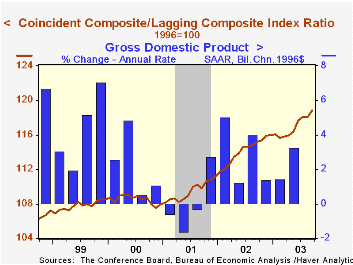 Global| Oct 20 2003
Global| Oct 20 2003Leading Indicators Fell
by:Tom Moeller
|in:Economy in Brief
Summary
The Conference Board reported that the Composite Index of Leading Economic Indicators fell 0.2% in September following four months of increase. The decline was slightly weaker than Consensus expectations for no change. The 0.4% [...]

The Conference Board reported that the Composite Index of Leading Economic Indicators fell 0.2% in September following four months of increase. The decline was slightly weaker than Consensus expectations for no change. The 0.4% increase in August was unrevised.
Gains amongst the leaders' component series fell to 40%. The diffusion of the prior month's gain was revised up to 50% from 45%. The percentage of leading components rising over a six month period rose to 85% but the prior month's figure was revised to a still-high 70%.
Higher weekly hours and higher stock prices were the only two component series showing meaningful gain. Influences from the other leading series were modest except the money supply which subtracted 0.17%, the first decline since March.
The Leading index is based on eight previously reported economic data series and two that are estimated.
The coincident indicators rose 0.1%. Year to date the coincident indicators are up 0.6% (AR).
The ratio of coincident-to-lagging indicators surged as the lagging index fell due to lower C&I loans and a weak CPI. The ratio is an indicator of excess relative to actual economic performance.
Visit the Conference Board's site for coverage of leading indicator series from around the world.
| Business Cycle Indicators | Sept | Aug | Y/Y | 2002 | 2001 | 2000 |
|---|---|---|---|---|---|---|
| Leading | -0.2% | 0.4% | 2.4% | 2.1% | -0.9% | 1.0% |
| Coincident | 0.1% | 0.0% | 0.4% | -0.2% | -0.4% | 3.4% |
| Lagging | -0.5% | 0.0% | -2.6% | -4.4% | -1.3% | 2.8% |
Tom Moeller
AuthorMore in Author Profile »Prior to joining Haver Analytics in 2000, Mr. Moeller worked as the Economist at Chancellor Capital Management from 1985 to 1999. There, he developed comprehensive economic forecasts and interpreted economic data for equity and fixed income portfolio managers. Also at Chancellor, Mr. Moeller worked as an equity analyst and was responsible for researching and rating companies in the economically sensitive automobile and housing industries for investment in Chancellor’s equity portfolio. Prior to joining Chancellor, Mr. Moeller was an Economist at Citibank from 1979 to 1984. He also analyzed pricing behavior in the metals industry for the Council on Wage and Price Stability in Washington, D.C. In 1999, Mr. Moeller received the award for most accurate forecast from the Forecasters' Club of New York. From 1990 to 1992 he was President of the New York Association for Business Economists. Mr. Moeller earned an M.B.A. in Finance from Fordham University, where he graduated in 1987. He holds a Bachelor of Arts in Economics from George Washington University.
More Economy in Brief
 Global| Feb 05 2026
Global| Feb 05 2026Charts of the Week: Balanced Policy, Resilient Data and AI Narratives
by:Andrew Cates






